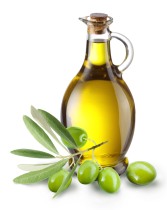
The jury is in: the Mediterranean diet saves lives, and plenty of them. Just this week at a cardiology conference in Rome (where else?) another large study confirmed it.
So why is it that I so rarely prescribe the Mediterranean diet for my patients?
To answer that, we must examine the dietary advice of GPs in general and, unfortunately, of me in particular.
But first, let’s look at the new evidence from the Moli-sani study.
A group of 1197 Italians with a history of cardiovascular disease were followed for eight years, and their degree of adherence to a Mediterranean diet was assessed on a 9-point score. The all-cause mortality was 37% lower in those who followed the diet (score 6-9) compared to those who didn’t (score 0-3).
That 37% is huge, by the standards of most medication interventions. In comparison, taking a statin (cholesterol medication) reduces mortality by around 25%.
Ah, but association is not causation, you rightly insist! The study can’t show that the diet is the actual cause of the reduction in deaths. Yet in this case, it probably is.
The study showed that for every two-point increase in the diet score, mortality decreased by 21%. This ‘gradient’ effect is very consistent with causation. And previous randomised controlled trials—notably the PREDIMED trial—have found a 30% mortality reduction in a Mediterranean diet group compared to a low-fat diet control group.
 So, if fish drizzled in olive oil and a mushroom salad washed down with a glass of vino prevents heart attacks, why am I not insisting all my patients follow it?
So, if fish drizzled in olive oil and a mushroom salad washed down with a glass of vino prevents heart attacks, why am I not insisting all my patients follow it?
Part of the answer is that my dietary advice tends to be fairly general. I usually mention fruit, vegies and cereal, and turn a Mediterranean blind eye to their wine intake as long as it doesn’t exceed their doctor’s.
I also work in a community health service with ready access to a dietitian; or to put it another way, I’ve become lazy. I put my deskilling down to my dietitian’s fantastic knowledge and long appointments.
 And of course, most patients don’t make radical food choices just because their doctor tells them. Many even ignore their dietitian.
And of course, most patients don’t make radical food choices just because their doctor tells them. Many even ignore their dietitian.
It takes a celebrity chef, fancy marketing and a weird super-food to sell a diet, at least long enough to buy the book. Then, after the dieter has failed a couple of fad diets, somehow taking a preventative pill each day seems less trouble.
But this latest impressive evidence has convinced me to start naming this particular diet. I seem to spend half my consultations dishing out medication advice for reducing cardiovascular risk, so it seems a disservice not to push the Mediterranean diet just as hard.
 I’ll point patients to the excellent Handbook of non-drug interventions (HANDI) and perhaps even google a few recipes.
I’ll point patients to the excellent Handbook of non-drug interventions (HANDI) and perhaps even google a few recipes.
Hmm…I’m still a bit tempted to get my dietitian to do all this for me.
Then I could get home in time for baked snapper, bean salad and my medicinal portion of shiraz.

Reblogged this on Rural General Practice and commented:
Wondering if Pizza is on the Menu? Gelato perhaps, or a nice Spaghetti al ragu?
LikeLike
I don’t know you’d get away with a meat-lovers or a greasy margherita, Ewen, but a classy seafood marinara heaped with oregano and garlic is just what the doctor ordered!
LikeLike
Yeah, as you suggest, the unlikelihood of adherence is one hurdle doctors must overcome if they expect their dietary advice to be more than a waste of breath. Apart from the fact there’s a lot of contradictory dietary information out there for punters to sort through (almost every food both causes and prevents cancer you know) there’s also the cost and convenience to consider. Big Macs are fairly cheap and as far as I know you can’t get a grilled salmon with salad in olive oil dressing on the PBS.
But what rarely comes out of these studies (or at least the media coverage of them) is how long (and how scrupulously) you need to stick to the diets to see the benefits. I can look at, say, a six month RCT of statins and get a fair idea of how much they’re likely to reduce my risk of heart attack (or at least a surrogate end point along the way to one) in the short term. Not so with lifestyle changes though. It’d be a bummer if I gave up my favourite cream cake only to have a fatal heart attack before my arteries started to clear.
I wouldn’t get too hung up on the correlation vs causality stuff either. Yeah, leaps of inductive logic can lead to some nasty falls, but these days you’re more likely to hear it abused to cast doubt on pretty solid evidence. Attempts to dismiss studies linking processed meat and bowel cancer and linking HRT and breast cancer are some fairly recent examples. Besides, according to David Hume you can’t even prove causality exists.
LikeLike
Thanks Cabrogal. I know what you mean about sticking to the diet – adherence is the achilles heel of so many fad diets.
Luckily, entire communities don’t find it too hard to eat the Mediterranean foods most of the time, which is probably one of its strengths.
The real-world study didn’t rule out those who occasionally strayed down Cream-Cake Road, so if you can tick most boxes on the survey below, you’re probably okay.
Click to access predimed14questionnaire.pdf
LikeLike
I know I’m contradicting myself a bit with regards to correlation vs causality but I can see real probs with the methodology of Martínez-González et al if it’s meant to be extended to people from non-Mediterranean backgrounds.
The questionnaire is likely to capture a lot of people from Mediterranean cultures without necessarily zeroing in on what aspects of their diet and lifestyle are protective. So simply bringing your diet into line with the questions may not be particularly helpful.
For example, if I had a large fried component to my diet but no salads I could tick 1 and 2 by switching from vegetable oil to olive oil. But I’ve heard the benefits of olive oil are largely negated by frying. I could earn another point by switching from a slab of VB to a cask of brown muscat every day.
And what’s this stuff about home-made vs shop bought pastries? Are they assuming all shop bought stuff contains trans-fats but no home made ones do? Should they be distinguishing between shop bought pastries and those made by a Greek grandmother according to a generations old recipe?
I reckon if there’s a take home message it’s this one:
“High consumption of nuts and low consumption of sweetened/carbonated beverages presented the strongest inverse associations with abdominal obesity.”
LikeLike